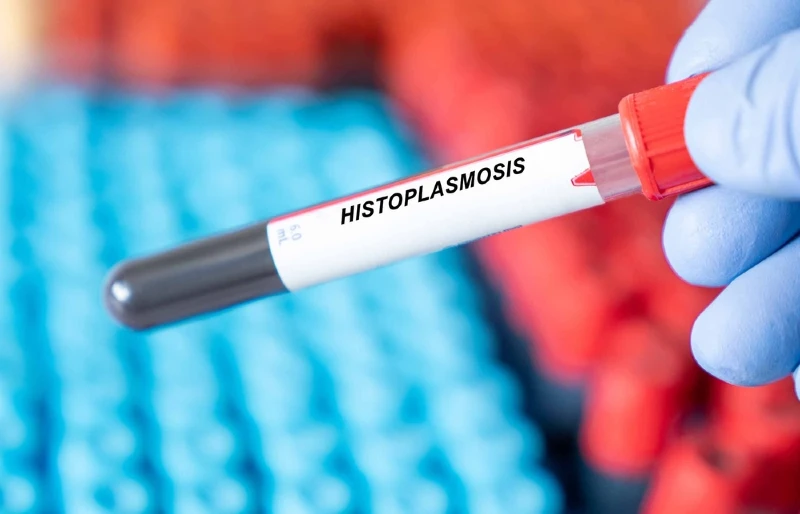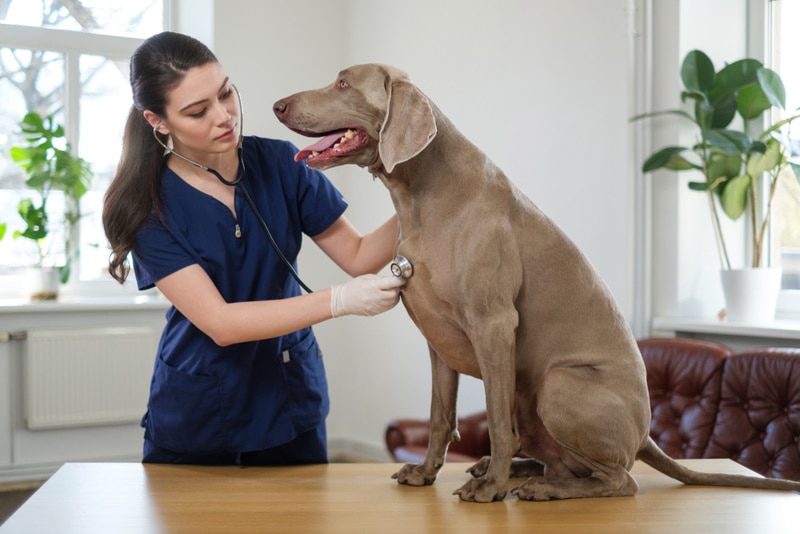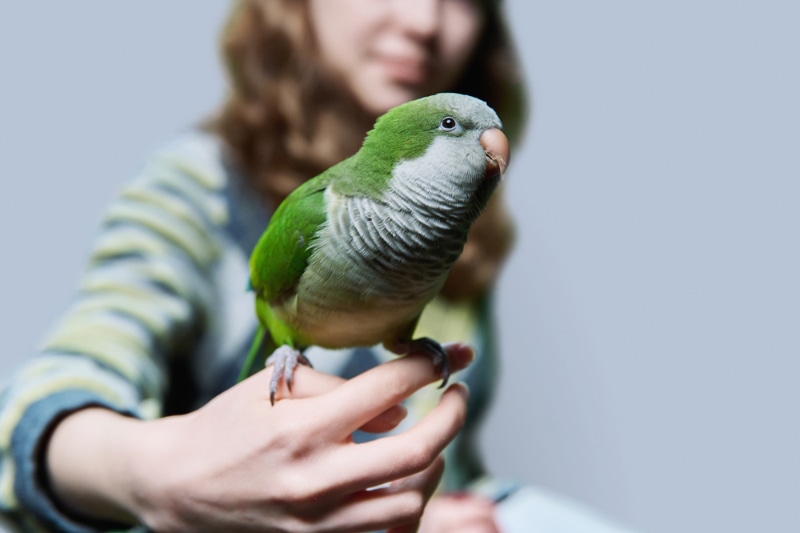Histoplasmosis in Dogs: Causes, Signs & Treatments (Vet Answer)

Updated on

Your dog enjoys exploring outside with you, whether you’re hunting or just wandering along nearby creek beds. Over time, your dog has lost weight and developed a cough that won’t go away. Initially, your veterinarian suspected allergies or an upper respiratory infection, but now they’re talking about running blood work and taking X-rays.
One of the possible conditions mentioned is histoplasmosis. What is this health issue, and what does it mean for your dog?
What Is Histoplasmosis?
Histoplasmosis is a fungal infection. Most pets are affected chronically, dealing with the infection over a long period.
A fungal organism, Histoplasma capsulatum, causes histoplasmosis. You won’t see this infection commonly; it tends to affect cats more than dogs. It is not contagious, but you could get exposed to the organism simultaneously as your pet, infecting you both.
Histoplasmosis can cause issues throughout your dog’s body, from lung problems where they might cough to spleen enlargement.
Histoplasma capsulatum prefers warm environments. While you can find it anywhere in the world, it’s more commonly found in major river valleys. You should be especially cautious in the United States if you live in or visit the Mississippi, Missouri, and Ohio River valleys.

What Are the Signs of Histoplasmosis?
The signs vary if your dog is exposed to histoplasmosis and develops an infection. It can be hard to pinpoint the cause with typical signs, including mild fever, lethargy or depression, inappetence, and weight loss.
Your dog could have different organ systems affected. While we think of many fungal infections localized to the lungs and causing a chronic cough, that’s only one place your dog could be affected. If the gastrointestinal tract is affected, your dog could have chronic diarrhea or even bloody stool.
Some dogs will have joint involvement, where you will see thickened joints that are painful to flex or extend. Draining skin lesions are possible. Your dog could even develop eye or neurological problems secondary to infection.
What Are the Causes of Histoplasmosis?
Your dog develops a histoplasmosis infection after exposure to the fungal organism.
Typically, dogs get exposed by inhaling Histoplasma capsulatum. It has been recovered in areas especially prevalent with bat or bird droppings.
Dogs that spend a great deal of time outside, such as hunting dogs, may be at a higher risk of developing the infection, given their higher possibility of exposure. Dogs are typically less than four years old when they are infected.
- Brittany Spaniels
- Pointers
- Weimaraners
Some dogs could, in theory, get exposed by eating fecal material from birds or bats. Another possibility occurs when your dog chews on moldering wood hosting fungal spores.

Diagnosing Histoplasmosis in Dogs
When your dog presents with vague signs consistent with histoplasmosis, your veterinarian will usually ask questions about your dog’s possible exposure. Talk to your vet about any travel outside of the area or if you’ve been hiking or caving with your dog.
Your veterinarian will usually recommend screening tests, including blood work and X-rays. Specific patterns may show up on X-rays with fungal infections in the lungs that your vet will be looking for, such as the presence of nodules. They might also see changes like liver or spleen enlargement that could suggest chronicity.
- Low red blood cell count
- Increased calcium
- Elevated liver enzyme values
Your veterinarian may collect swab samples of draining lesions to evaluate for microorganisms that could be causing the infection and may detect histoplasmosis with that. Your veterinarian can check for causative fungal agents through serology testing.
Unfortunately, diagnosing histoplasmosis can be tricky. Serology or cytology could be a false negative if the organism is located within a walled-off tissue area.
How Do I Care for a Dog With Histoplasmosis?
The main component of therapy for dogs is antifungal medications. Two commonly used medications are fluconazole and itraconazole. Give the antifungals with a meal so that your dog absorbs them best and to try and keep their stomach settled.
While newer-generation antifungal medications have fewer side effects and are better tolerated than previous therapies, they can still be very hard on your dog’s body. Most veterinarians will want to evaluate blood work regularly, such as every few weeks, checking for changes in values that could be caused by worsening disease or issues with how your dog is handling the medication.
Treatment for histoplasmosis usually lasts for six or more months. Your vet will treat your dog until the infection is totally cleared because of the risk of it rebounding in cases of incomplete therapy. The rule of thumb is to treat at least one month past the time clinical signs are present.
During treatment, your veterinarian may need to treat your dog symptomatically for other issues. If your dog isn’t eating or drinking normally, they may prescribe fluid therapy or medications like Entyce to get your pup eating. Some dogs get secondary bacterial infections and need antibiotic therapy.
To ensure your dog is treated successfully, your veterinarian will usually want to repeat testing for histoplasmosis in several stages. First, they’ll treat until your dog has been free from symptoms for at least a month. If that test is still positive, they will treat it until it’s negative. They’ll typically recommend retesting 3 to 6 months later to ensure your dog has not relapsed. According to the Merck Veterinary Manual, relapses may occur in roughly 10 to 40% of pets.

Frequently Asked Questions (FAQ)
Is Histoplasmosis Contagious?
It’s normal to be concerned about whether you can get histoplasmosis from your dog. The good news is that it doesn’t appear to be contagious from pet to person or pet to pet.
It is still possible for other pets in the household or for you to become infected. This infection generally occurs because you’ve been exposed to the same place as your furry friend.
Is It Safe for Your Dog to Eat Bird Droppings?
You should never let your dog eat bird droppings, which is often easier said than done. Your dog could be exposed to pathogenic bacteria like Salmonella and organisms like Histoplasma capsulatum. Some dogs may even become infected with different intestinal parasites by eating bird droppings.
Conclusion
Histoplasmosis is a serious health condition for dogs, but it’s thankfully not incredibly common. If you notice that your dog is losing weight or feeling lethargic, contact your veterinarian and tell them about anywhere your dog has been to increase the chances of a timely diagnosis.
Featured Image Credit: luchschenF, Shutterstock













